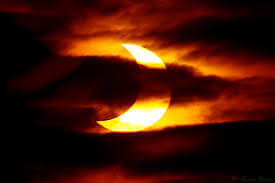Posted by: University Eye Specialists in Uncategorized

On August 21st Tennesseans, as well as families across America, will be fixated on a once in a lifetime event – a total solar eclipse. It is this potential ‘fixation’ that is causing some concern within the eyecare community at large. The physicians at University Eye Specialists want to provide you with the knowledge needed to have a fun and SAFE experience this August. This incidence will undoubtedly be a memorable moment of life. At University Eye Specialists we dedicate ourselves to “Helping you Live Life in Focus.”
What is a total eclipse?
Simply stated, a solar eclipse occurs when the moon passes between the Earth and sun. This will cause the appearance that the sun has been eclipsed, or covered over. A total solar eclipse is a much rarer phenomenon that occurs when the overall circumference of the moon lines up just right – not allowing the sun to shine through at all. The view of a total eclipse is dependent upon location. That is why we are so excited in East Tennessee as we are at an optimum viewing angle. As the moon begins to eclipse the sun the sky will become progressively darker. When the sun is entirely blocked we will experience utter mid-day darkness; providing a memorably-eerie look and feel.
The Sun and your Eyes
Science has proven the effects of long term exposure to ultraviolet radiation. Cataracts, a condition wherein the internal lens of the eye becomes cloudy and opaque, has been shown to progress dramatically faster in patients that are exposed to frequent UV radiation. Macular degeneration, a disease that affects central vision, has also been correlated to UV exposure. As the sun is the source of damaging UV radiation it is ever so imperative that we properly guard ourselves from unnecessary and increased exposure. We may not be able to feel the impact, but rest assured that on a molecular level our eyes are all too aware.
Short term, high levels of ultraviolet radiation exposure, as with viewing a solar eclipse, can be extremely dangerous if proper precautions have not been taken. Photokeratitis is one common ailment caused by looking directly at the sun. The danger of Photokeratitis is that one would not realize the damage that was caused until hours after the viewing. This condition can be likened to having a sun burn on your corneas. The eyes may feel pained, gritty and sensitive to light. Permanent visual damage is also possible.
Photobleaching of the retina is also a major concern of looking directly at the sun. The retina is an ultra-thin, light sensitive layer of the eye comprised of millions of nerve cells. When light is focused onto the retina, these cells send patterns of information to the brain to be interpreted as images (what we see). Looking directly at the eclipse can be especially damaging because our retinal cells cannot handle that much direct energy from the sun’s rays. Even a glimpse can produce transient “spots” in one’s vision. Not only can this cause momentary blindness, but worse it can also cause irreversible degeneration of retinal cells – the effects of which can be permanent and lead to loss of sight and other eye complications. This is enough to make your nervous cells, well, nervous…
Eclipse Glasses
Be wary of mass produced eyeglasses that are touted as “safe for viewing the solar eclipse.” Not only must they have ISO 12312-2 stamped on the glasses themselves but they must also be free of defect and provide ample side vision coverage. Glasses that have visible scratches are ineffective and should be discarded. NASA recommends only purchasing ISO 12312-2 eclipse glasses from the following companies: American Paper Optics, Rainbow Symphony, Thousand Oaks Optical, and TSE 17. Eclipse glasses are not the same as sunglasses! Sunwear (even with the darkest of tints) permits way too much light to pass through the lens. Eclipse glasses have a built in nearly opaque filter that only allows for a fraction of a percentage of visible light to permeate the lens and reach your eyes.
This August when you are tempted to look at the sun during the magnificent eclipse, please remember that doing so comes with great risk. There are many adverse effects of direct sun viewing that could truly diminish your sight and thus your quality of life. Preserve your precious vision through properly protecting your eyes with only NASA recommended ISO 12312-2 eyewear, and inspect the glasses for any apparent defects. Since 1935, University Eye Specialists has been in the business of defending vision. Celebrate the historical uniqueness of August 21st with both excitement and caution – taking care of your most precious sense, the gift of sight.


